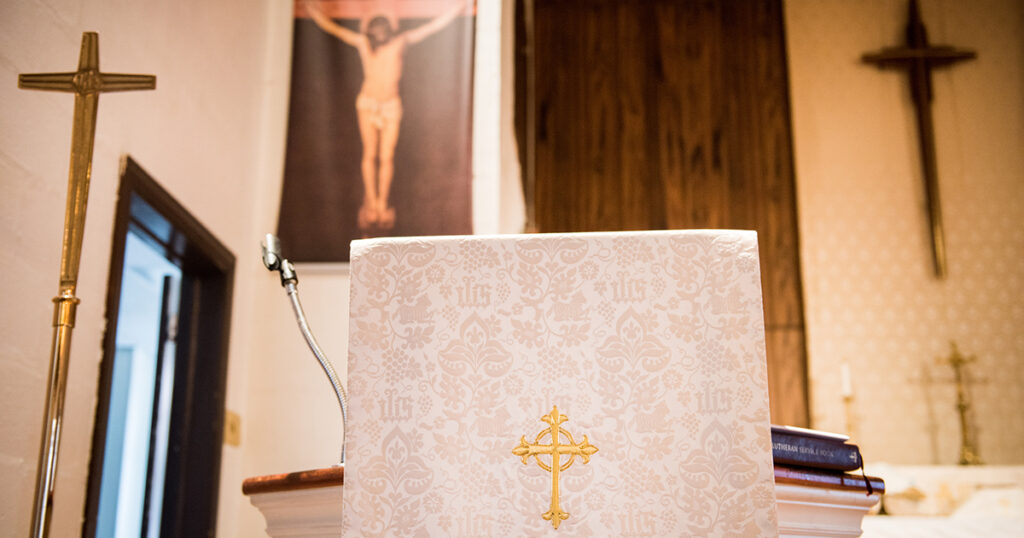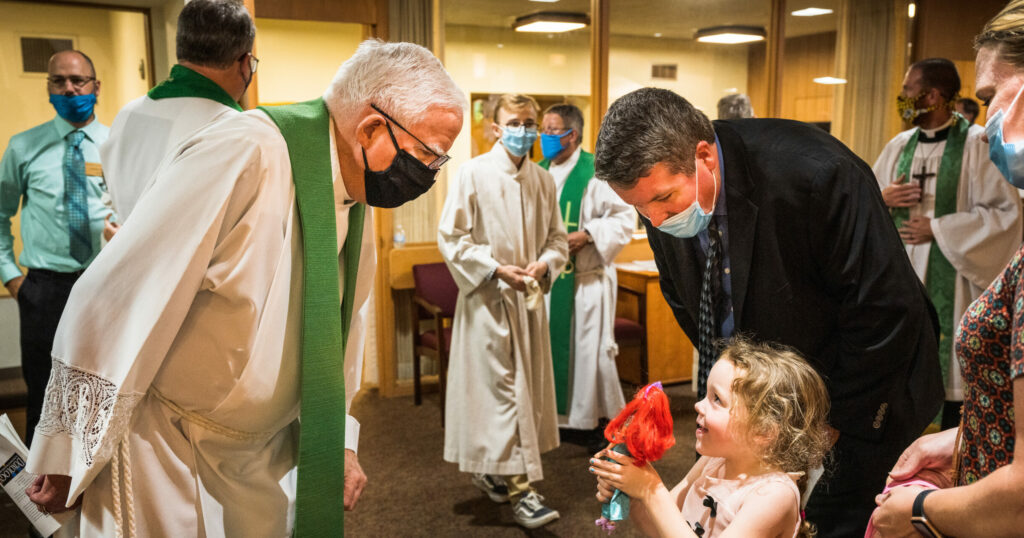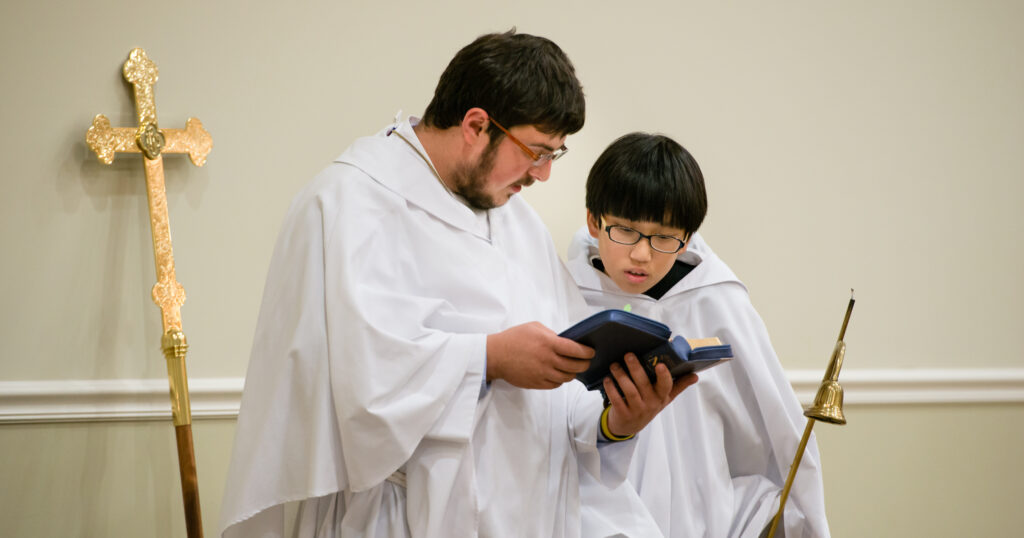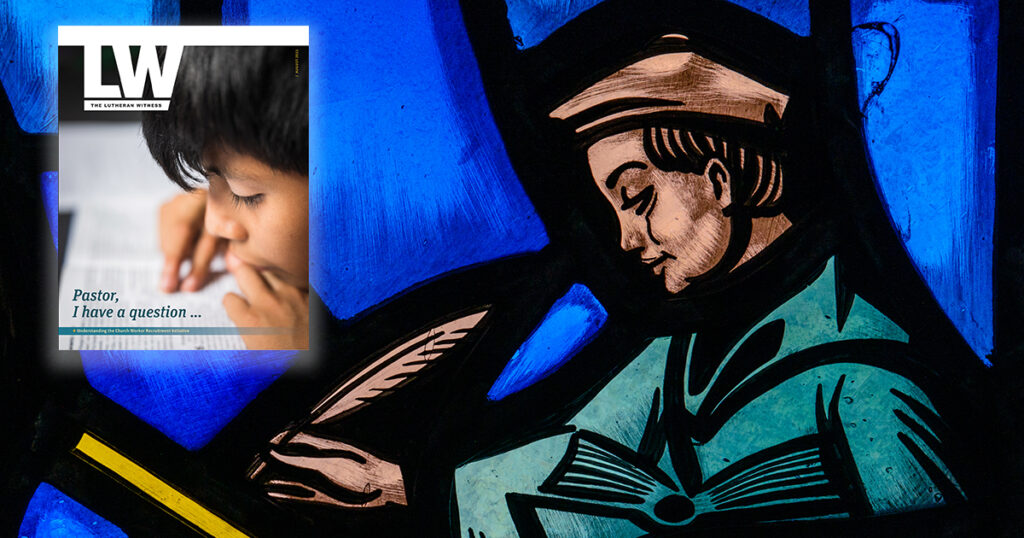This year marks the 50th anniversary of the decision by two predecessor bodies of the Evangelical Lutheran Church in America (ELCA) to ordain women into the pastoral office. Numerous news releases and posts on social media have called on church members to celebrate this accomplishment. Some wonder why The Lutheran Church—Missouri Synod is slow to follow in the steps of their seemingly more progressive American Lutheran siblings.
The decision made in 1970 by the Lutheran Church in America (LCA) and the American Lutheran Church (ALC) to allow women to be ordained jeopardized the altar and pulpit fellowship established between the LCMS and ALC just two years earlier. Now it is widely recognized that there was no significant church-wide theological study that preceded the decision to permit women’s ordination. Carried along by the winds of the emerging feminist movement, the example of some European Lutheran churches, and a general egalitarian commitment that removed the distinction between the royal priesthood of believers and the Office of the Ministry, the LCA and ALC departed from biblical teaching.
Warning signs
While many Protestants take it for granted that women may serve as pastors, this was not always the case. For example, the highly acclaimed Lutheran pastor murdered by the Nazis in 1945, Dietrich Bonhoeffer, said in his lectures on 1 and 2 Timothy:
In every teaching of the law lies the danger of establishing new laws, thereby rendering the ordinances of God powerless. Human and pious ideals are enemies of divine ordinances and commandments. Thus, a new teaching of the law easily leads to disorder in the relation between man and woman. Often it is the case that overzealous [schwärmerisch] teachers will try to win women over by promising them special rights. For Paul the order is clear: Women have a full part in salvation and truth. But they have a different vocation from that of men. … She should and can learn, but in submission. Learning should not make her quarrelsome. She is not supposed to teach and to dominate. Paul says: I do not allow this. She will be able to display greater wisdom in submission than in dominion. This is not merely conservatism but biblical order.[1]
Bonhoeffer explained that woman do not have a lesser value than man, but that her vocation differs from man and the church must recognize this difference. Against those who would see 1 Timothy 2 as culturally conditioned or merely as pastoral directive to a troublesome but isolated situation, Bonhoeffer asserts that this apostolic directive is grounded in a biblical order that the church ignores to her peril.
Anders Nygren (1890–1978), bishop of Lund and first president of the Lutheran World Federation, spoke prophetically in 1958 after his Church of Sweden implemented the ordination of women. He said the decision would lead to an understanding of God more akin to pagan Gnosticism than the Bible. His protest along with that of other faithful theologians like Hermann Sasse, Bo Giertz, Regin Prenter, Bo Riecke and Peter Brunner went unheeded.
Another Swedish theologian, Krister Stendahl (1921–2008), wrote a significant essay, The Bible and the Role of Women (Fortress, 1966). In this work, Stendahl argued that the traditional prohibition of women from the pastoral office fits with the intent of the biblical writers, but that the “then and there” meaning may not determine how we understand these texts today. Stendahl argued that Paul’s declaration in Galatians 3:28, that in Christ there is neither male nor female, overrides the restrictions that he places on women elsewhere. Forty years later, this same way of reading Scripture opened the way for the ordination of gay and lesbian candidates in the ELCA and other mainline Protestant churches in North America and Europe.
Four insights from 1 Corinthians 14
Confessional Lutherans cannot reconcile Stendahl’s approach to reading the Bible with the witness of Holy Scripture. The prohibitions of 1 Timothy 2:8–15 and 1 Corinthians 14:33–38 are not overturned by the Gospel. While this short article does not offer a thorough examination of these texts, four items do stand out from 1 Corinthians 14:33–38.[2]
First, there is the catholic or universal practice. That women are to keep silent in the liturgical assembly, that is, they are not to assume the office of preaching, is not merely Paul’s preference. It is not just a rule for the chaotic state of affairs in the Corinthian congregation, but Paul declares that it is “as in all the churches of the saints” (1 Cor. 14:33).
Second, Paul takes his readers back to God’s law: “For they are not permitted to speak, but should be in submission, as the Law also says” (1 Cor. 14:34). Redemption does not overthrow God’s good ordering of male and female in creation. God’s law does not save but it does provide structure and order in creation. Christians as new creatures in Christ — both male and female — joyfully submit themselves to God’s design.
Third, there is the “command of the Lord” in 1 Corinthians 14:37. This strong language closes the door on the interpretation that Paul only offered this advice as a solution to the troublesome disruption caused by overly talkative women in the congregation. Paul uses a similar formula when dealing with the Lord’s Supper in 1 Corinthians 11:23: “For I received from the Lord what I also delivered to you.” Christ Jesus instituted the Office of the Ministry on Easter evening with the sending of His apostles (see John 20:19–23). This Office is from the Lord, not from human beings. It was not designed or put in place by the will of human beings, but by the risen Lord Himself. Accordingly, our Lord entrusted the Office only to qualified men.
Fourth, the apostle uses weighty language in concluding his argument. “If anyone does not recognize this, he is not recognized” (1 Cor. 14:38). The language of recognition is vocabulary of church fellowship, a critical theme in 1 Corinthians. Fellowship with one another (horizontal) comes from the fellowship we have in Christ through His words (vertical). We may not create fellowship with one another if this means breaking fellowship with Christ by ignoring or rejecting His words. There can be no church fellowship, that is, altar and pulpit fellowship, with those who claim the right to ordain women into the pastoral office.
Much has happened in American Lutheranism since the fateful decision was made to ordain women to the pastoral office 50 years ago. No doubt that this decision, hastily made, had long-term and perhaps unintended consequences in the churches that would become the ELCA. We do not question the sincerity or good intentions of those women who have elected to pursue ordained ministry, but we cannot celebrate a decision that contradicts the testimony of the Spirit in His apostolic Word.
[1] Dietrich Bonhoeffer, “Exercises in the Pastoral Epistles” in Dietrich Bonhoeffer Works, vol. 15, Theological Education Underground: 1937–1940, ed. Victoria J. Barnett, trans. Victoria J. Barnett, et al. (Minneapolis: Fortress Press, 2012), 330–31.
[2] Readers may consult the essays in Women Pastors? The Ordination of Women in Biblical Lutheran Perspective,ed. Matthew C. Harrison and John T. Pless (St. Louis: Concordia Publishing House, 2012).






Born and raised Missouri Synod Lutheran. Will
be until the day I die! “Accidentally” meaning I didn’t do my research joined a ELCA church when I moved to SLC because it was the first Lutheram church I saw in a sea of Mormon “stakes”
When a woman got up to preach I was like ‘oh no’
Swiftly found a LCMS in Murray Utah and changed my errant ways! Always do your research
LCMS didn’t allow women to teach (as per St. Paul) until the shortage of men during WWI. Than practicality required a rethinking of that doctrine & women were allowed to become teachers in LCMS schools. Thoughts?
Martin Luther encouraged Katherine to be involved in dialogue. The Bible though inspired by God was written by men in a time when women were generally considered chattel and less than men. If we take these scriptures literally then we must also accept many other things which are counter intuitive in our current way of life. Jesus came to offer salvation to all and also love for all. We are ALL Gods children.
Wow. Some of the responses to this article on Facebook are alarming. However, not surprising, given the lackadasical attitude of some who will not address the issues of heterdoxy within the LCMS. If we can not address biblical truths readily within our own church body how can we expect to defend these truths to the world. The Bible is clear on who is to preach the Word. It leaves no room for doubt. Those who would deny this, do so at their own peril. Lord have mercy.
Definitely the best exposition I have seen on the subject
Thank you for this thoughtful and thorough exposition, Professor Pless.
I don’t know why they continue to use the moniker, “Lutheran” when clearly they teach doctrines that Luther would condemn.
Thank you for your continued faithfulness and teaching. May we continue to listen to the words of Christ concerning the Office He established to be the way through which saving faith is obtained.
I agree with you totally. I was brought up in the Missouri Synod since my Brooklyn, N.Y. church was built in 1950. The only members we lost to theology was not over this issue. We lost numerous members who could not believe that the Missouri Synod preached opposition to the gay issue. Many of our members had children who went to public universities where their professors were gay or converted them to believe that believers should be accepted whether gay or not. Over time we lost their wealthy parents to the ELCA. Unfortunately, in the 1960’s we had over 400 members until Robert Moses decided to build a bridge to Staten Island. 7000 homes were destroyed for this project. In 1965, I decided to attend Concordia, Bronxville after I graduated from conservative high school. Most of the students were away from home for the first time. I took up theology as my major. I
had the honor of taking Latin & Greek with Dr. James L. Brauer. He was the only professor there worth the year. The students cheated and partied all the time! I then chose to move back to my conservative Brooklyn to get a free education on a NYC scholarship. From there, I applied to Concordia Springfield in 1969, and was rejected when I would not tell them who I voted for in 1968 and explained why I left Concordia Bronxville. I then went on to get my MA, in NYC, turned to the conservative PCA, went to their seminary in Orlando Florida and received a MA from them. Their professors taught the Theology which you talk about and the students acted in a very religious way. I am happily retired from a NYC civil service job and back to my OLD church which is lucky to get 10 members older than me on a Sunday. The members get LCMS theology every Sunday with no clergy available! Now I can only reflect on the past! Keep up your fine work!
I do so appreciate the wisdom Dr. Pless shares in his article.